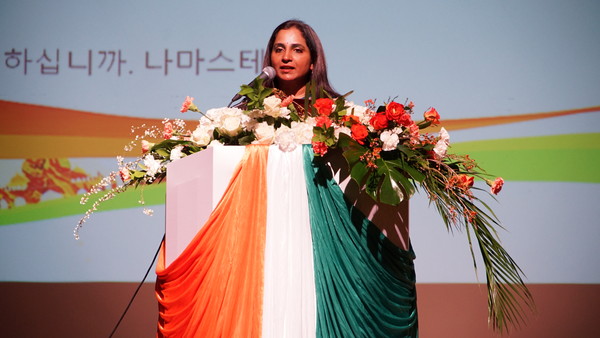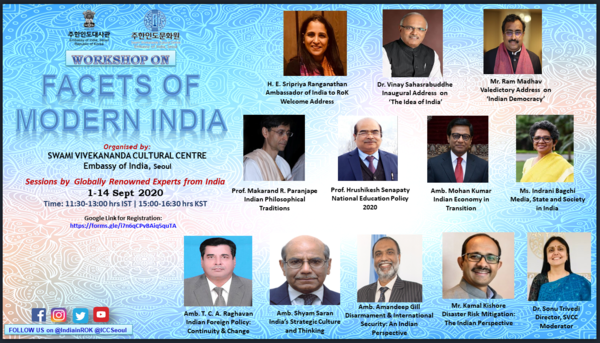On the topic of ‘Facets of Modern India’
The following article was contributed by the Embassy of India in Seoul to The Korea Post media for publication.—Ed.

Indian Cultural Centre, Embassy of India, Seoul organized a ten-day online workshop on ‘Facets of Modern India’ by globally renowned experts from India - a truly master class of ideas of India, by top class, best and brightest minds from India.
Indian Cultural Centre in Seoul has been a pioneer, in fact a first, in starting this truly intellectual enterprise among all the Indian Cultural Centres worldwide. The sole mission was to develop a rich and nuanced understanding of Modern India, the civilization, the state, in all its diverse manifestations amongst audiences abroad that always wanted to know more and more about India.
Since day one of this Workshop, series of brainstorming sessions were organised with an excellent galaxy of speakers, all leading in their own domain, to give glimpses of Modern India on a virtual platform. The Workshop started on 1st Sept with the Inaugural Address by President of ICCR Dr. Vinay Sahashrabuddhe on the ‘Idea of India’ subsequent lectures were by Prof Makrand Paranjape, Prof. Hrushikesh Senapaty, Amb Mohan Kumar, Ms Indrani Bagchi, Amb T C A Raghavan, Amb Shyam Saran, Amb Amandeep Gill and Mr Kamal Kishore on issues related to Indian Philosophy, Education Policy, Economy, Media, Foreign Policy, India’s strategic culture, Disarmament, International Security and India’s response to Disaster risk mitigation.
The Valedictory lecture on 14th September was delivered by Mr Ram Madhav on the Indian democratic experience. Outlining the features of ‘Parliamentary Democracy’ in India, he shared his perspectives on the working of Indian democracy at the grassroots level and the challenges thereof. He also shared the contribution of great Indian leaders such as Mahatama Gandhi. Dr. Rajendra Prasad and Dr B. R. Ambedkar in building up the Modern India. He also spoke about the role of ‘people’s power’ in a democracy and counted upon the achievements of the current government.

This lecture was also attended by Mr. Oh Young-jin, President of Korea Times who spoke on geo-political dimensions of the region and historical and cultural linkages between the two countries. According to him, ‘democracy’ is a common element that binds both the countries and they can together fight with the undemocratic forces challenging them. He also shared South Korea’s path to development and democracratisation along with major political developments in Republic of Korea. All the lectures are on the social media handles of the Cultural Centre, and could be accessed for any future reference.
The Workshop received overwhelming response and was attended by students, researchers, academicians, Indologists and journalist from both India and Republic of Korea in large numbers.

